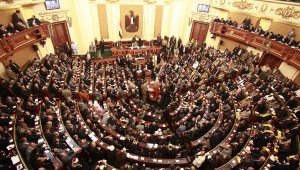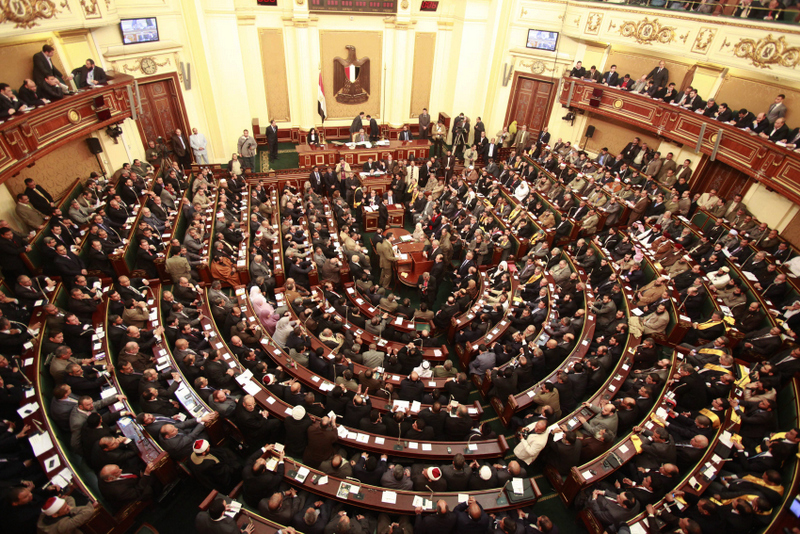
A Supreme Constitutional Court (SCC) ruling on Sunday will decide the fate of upcoming parliamentary elections, whether they will be postponed or proceed.
The court postponed Wednesday its final verdict regarding lawsuits claiming the unconstitutionality of the parliamentary elections law to Sunday.
The government passed three political laws: the law defining political rights issued ahead of the presidential elections last May, the law organising the establishment of the parliament and the law that defines the electoral districts.
The third law is the source of the elections’ delay. It was issued by President Abdel Fattah Al-Sisi last December, and includes two sections, each dividing the country into electoral constituencies, according to the two voting systems available: the closed list and the individual list.
The laws were mainly contested on claims that they violated constitutional guarantees for equal and fair representation. These include the allocation of parliamentary seats to each electoral constituency, and the expenses allowed for electoral campaigns, which are set to a maximum of EGP 500,000.
Last week, a commission of SCC-affiliated senior judges approved several lawsuits demanding the annulment of parliamentary laws due to unconstitutional content, turning the fate of the parliamentary elections upside down.
There are three options in Sunday’s ruling: the court rejects appeals against the three laws, it accepts all or some of the appeals or it adjourns giving verdict.
The court’s ruling will provide constitutional immunity to the laws it approves its constitutionality.
“The best scenario will be: the court accepts appeals and gives the chance to authorities responsible for legislation to amend the articles in the laws that the court deems unconstitutional,” says Yasser Kasseb head of the Regional Centre for Research and Consultancies (RCRC).
Kasseb also said adjourning the case and not giving a verdict before holding the elections would threaten the constitutionality of the parliament and it will be in danger of dissolution.
He suggested, in case of accepting appeals on the laws, that the court will give an approximately 45 day period for the authorities to amend the articles the court deems unconstitutional.
He explained though that the SCC commission that advised with accepting the appeals is an advisory body.
Political elections are managed by the independent committee, the Supreme Electoral Commission (SEC). The SEC had opened doors for the parliamentary procedures to begin earlier in January, announcing that the elections will start in March. It began by allowing NGOs and media to register for the monitoring and coverage of the elections.
Candidates were supposed to apply at the SEC between 8 and 17 February, but according to an inside source from the commission, a complication occurred, causing slight amendments to the original schedule.
“The court required parliamentary candidates to pass a medical test for the first time, and there was a lack of proper coordination between SEC and the Ministry of Health on the matter,” the source, who requested anonymity, told Daily News Egypt.
On 19 February, the SEC closed the doors for applications and published Tuesday the names of over 5,000 candidates and the districts they wish to run for. Those names are subject to change within the following week, because there could be appeals before the court regarding the eligibility any of the candidates.
Last October, politicians and parties were asked to submit to the cabinet their draft versions of the parliamentary law dividing the country into different constituencies. These would be represented inside the parliament by one or more candidates, depending on the legal division accepted.
“We applied several proposals for district distribution law, which the authorities didn’t take into consideration,” the Egyptian Social Democratic Party’s (ESDP) Secretary General Ahmed Fawzy told Daily News Egypt.
Politicians reacted angrily to the passing of the law organising parliamentary elections last June. Liberal Al-Wafd Party chairman El-Sayed El-Badawi said during a roundtable discussion regarding elections, the political laws of 2014 were problematic because they were written by legal experts who have no background in politics.
Fawzy said: “I will be happy if the court ruled the laws are unconstitutional.” He explained that his party, in case of the elections’ postponement to amend laws, will propose amendments ensuring more fair laws regarding representation.
“If the elections were held with these [current] laws, it will not be fairly representing people and they will feel it,” he asserted.
According to the roadmap put in place following the ouster of former president Mohamed Morsi, parliamentary elections were supposed to take place before presidential elections. But in January 2014, interim president Adly Mansour announced an amendment in the order of elections, which saw Al-Sisi’s inauguration in June.
The government is raising high hopes on the upcoming international “Economic Summit” to be held on 13-15 March. It is seeking to assure the international community that the democratic political transition is ongoing through pushing the elections to be announced before the summit.


